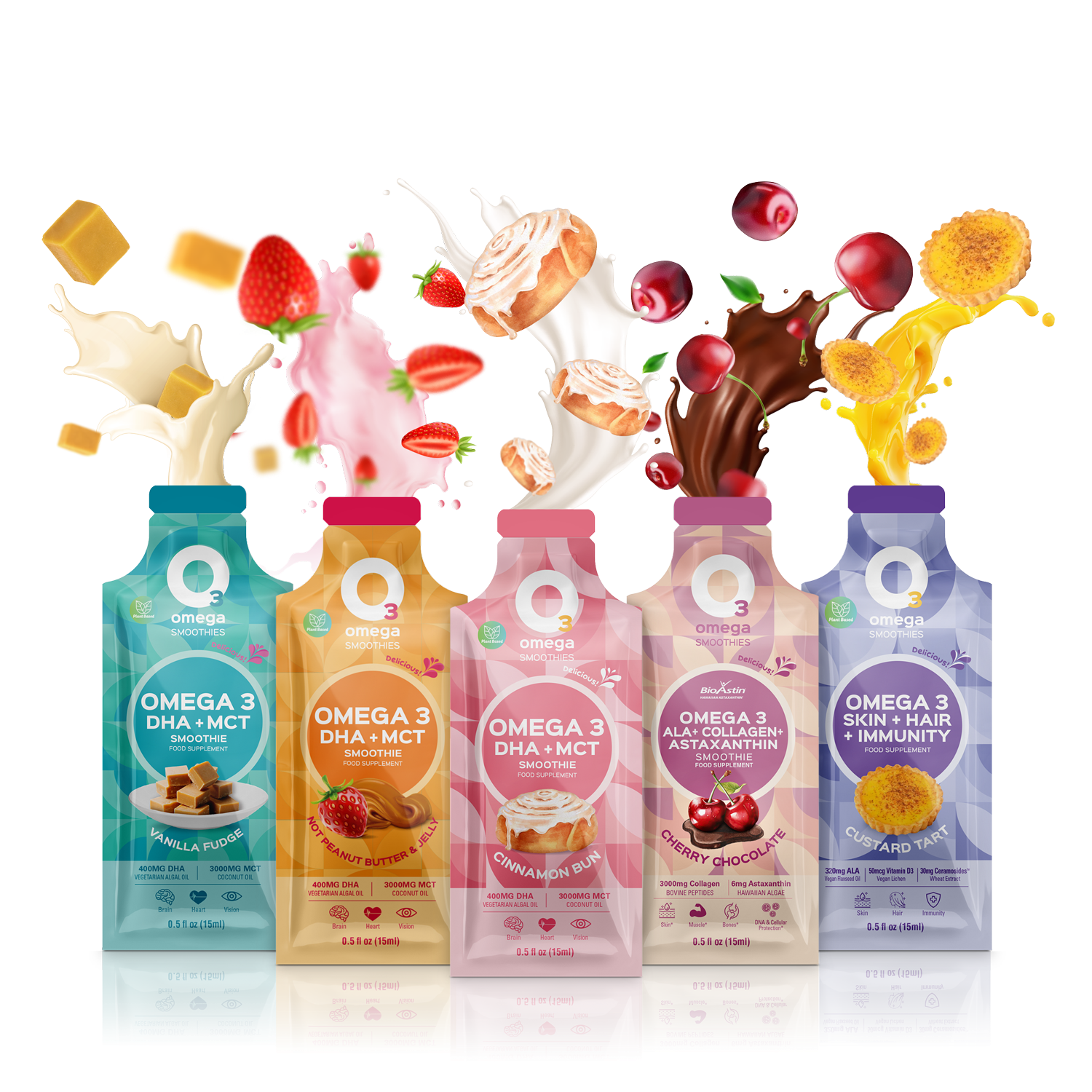Building on its range of existing formulations (Vanilla Fudge and Not Peanut Butter & Jelly), the three new flavors—Custard Tart, Cherry Chocolate and Cinnamon Bun—incorporate plant-based omega-3 sources such as algal oil and flaxseed oil.
Designed to be eaten on their own, stirred into coffee or squeezed onto breakfast, the supplements are “brain food disguised as treats,” says Sara Fenn, O3Omega’s newly appointed CEO.
“Supplements don’t have to be boring, they can be delicious and efficacious at the same time. We’re trying to do something that other brands aren’t doing —making healthy and effective supplements that do not compromise on quality or flavor.”
Why algal oil?
Omega-3 DHA is essential for the normal functioning of the heart, eyes and brain. In fact, the brain is roughly 60% fat, with DHA making up over 90% of the n-3 PUFAs in the brain and 10%–20% of its total lipids. However, the human body cannot synthesize DHA naturally.
Since the Western diet is generally lacking in oily fish, the majority of the population lacks this essential nutrient, leading many to turn to supplements.
Typically, omega-3 supplements use fish oils derived from the tissues of oily fish such as salmon or anchovies. However, fish oil extraction contributes to overfishing and is also prone to spoiling, Fenn noted.
“When fish oil is oxidized, it becomes toxic,” she explained. “Fish oil could sit in a capsule potentially for years before it gets to you, but if it’s encapsulated, you might not realize you are eating a rancid oil.”
“Not only is oxidized fish oil a little bit poisonous, but it also is highly correlated with cardiovascular issues,” she added.
Derived from marine algae, algal oil is rich in omega-3 DHA and almost colorless and odorless when purified.
“Algal oil is absorbed in exactly the same way as fish oil, but it’s safer, more stable and more sustainable,” she said. “Because it’s grown in vats, it is also kept pure from mercury and other PCBs.”
Fenn said this drove O3Omega (a subsidiary of Virun NutraBioSciences) to use “natural plant-based alternatives” to fish oil in their supplements, offering the same benefits as fish oil while minimizing the risk of contamination and damage to our oceans.
What are PCBs?
Polychlorinated biphenyls (PCBs) are harmful environmental contaminants which fish can absorb when swimming in contaminated water.
New flavors, new benefits
The range not only brings new flavors but also added benefits. While Cinnamon Bun aims to support brain, heart and eye with a similar formulation to the existing flavors (3,000 mg MCT and 400 mg algal oil DHA), Custard Tart and Cherry Chocolate bring immunity and beauty-promoting ingredients.
Custard Tart is comprised of flaxseed oil, ceramides and vitamin D3, with vitamins designed to promote immunity and ceramosides for skin and hair health.
Comparatively, Cherry Chocolate is formulated with bovine collagen peptides and astaxanthin—a type of red algae that is 100 times higher in antioxidants than vitamin C. While collagen supports skin, muscles, bone and cartilage health, astaxanthin contributes to the protection of cells and DNA from oxidative stress.
Each of the formulations use natural extracts as flavorings—with no sweeteners, sugars or artificial preservatives—and are processed in a way which optimizes absorption and bioavailability.
“Collagen on its own is quite difficult to absorb, but we use hydrolyzed bovine peptides,” Fenn said. “Because they are hydrolyzed, they are broken down in such a way that the body can absorb them better. Then we’ve added extra fats to encapsulate them because you absorb all nutrients better if they’re combined with fat.”

Tackling criticism
Fenn says the smoothie sachets are an ideal grab-and-go option for consumers looking for healthy yet delicious omega-3 supplements.
“We have made products that we would want to have ourselves,” she said. “Our ideal is that when a parent is buying a treat for their child in the shop, they can choose a delicious DHA supplement which will feed that child’s brain as opposed to a chocolate bar or a pack of sweets.”
On tackling criticism for appearing as an ultra-processed food, Fenn said: “We’ve had a few points on the products looking too much like treats or ‘too delicious’, but that’s kind of what we’re going for. We might look processed, but it’s as clean as you can get. It’s incredibly beneficial for the brain, but it’s disguised as a treat.”
Speaking about the next steps for O3Smoothies, Fenn said she would like the brand to become “the biggest in omega-3 supplements across the board.”
“We want to bridge the gap between a supplement and a food, offering healthy treats which are accessible for families, children and adults.”
The new O3Smoothie flavors will launch across Europe at the beginning of April. Products will be available online and in store at Whole Foods and other retailers (RRP: £29.95/30 sachets).





